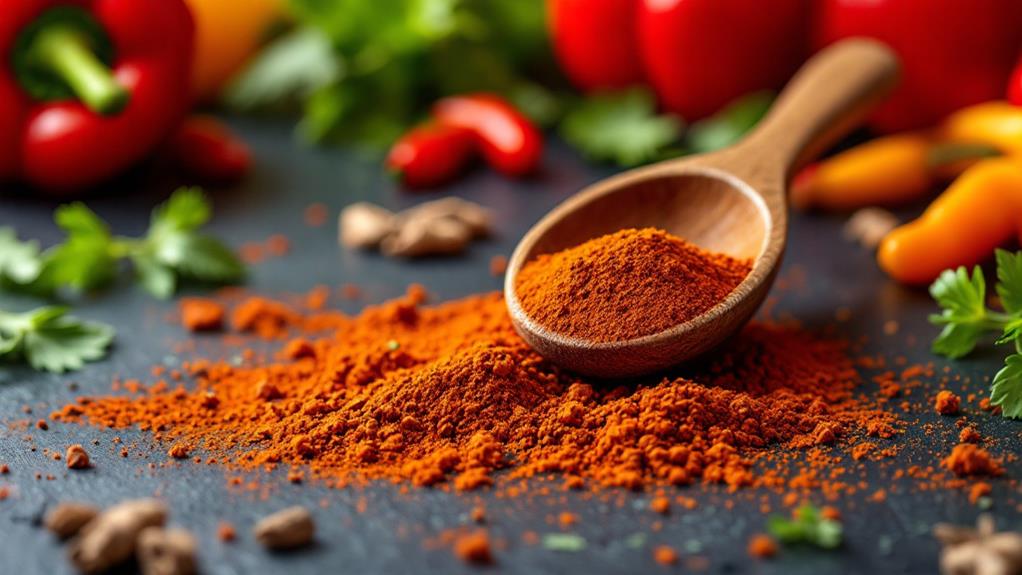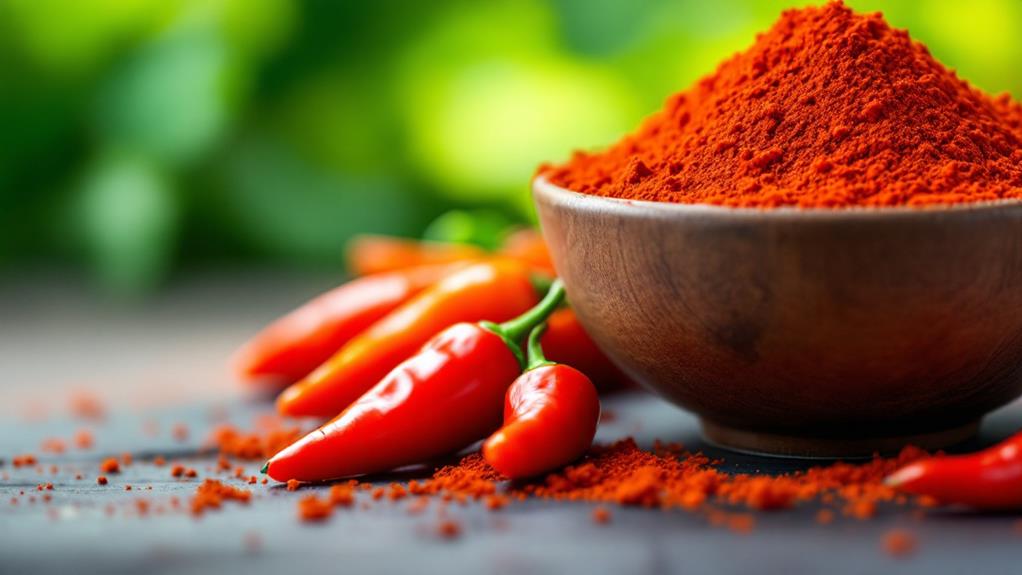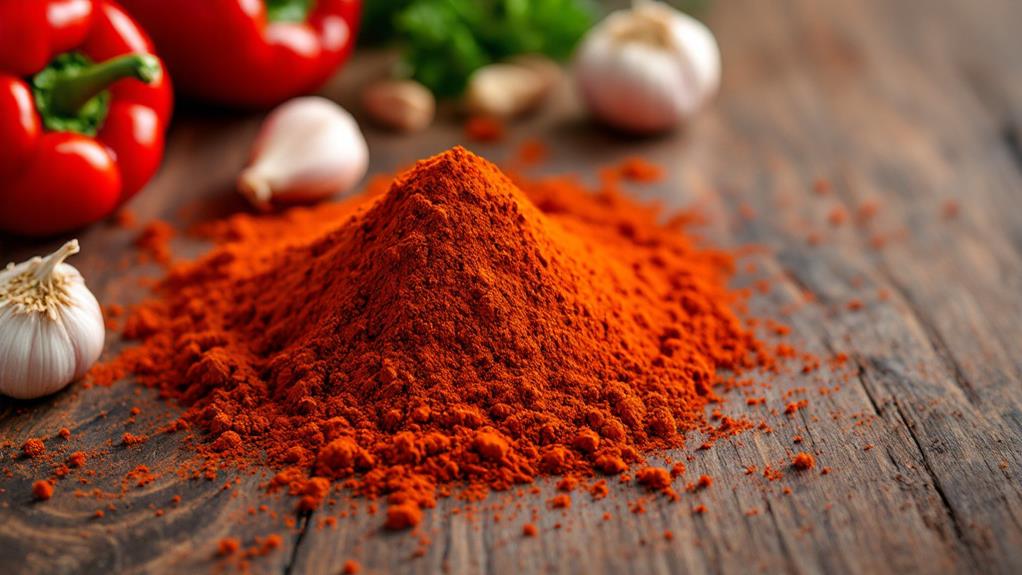The Health Benefits of Paprika: A Versatile Spice for Better Health

Paprika is more than just a colorful spice; it's a powerhouse for better health. Packed with vitamin A, iron, and antioxidants like carotenoids, it enhances your immune system while supporting eye health and reducing inflammation. It's low in calories but rich in fiber, aiding in digestion and helping you feel full. Its capsaicin content can help manage blood sugar and improve heart health by reducing cholesterol and blood pressure. Plus, it could even lower the risk of certain cancers. Adding paprika to your meals isn't just tasty, it's a smart choice for your well-being. There's plenty more to this spice.
Nutritional Profile of Paprika
Exploring the nutritional profile of paprika reveals why it's a popular improvement to many dishes. You'll find that paprika is not only flavorful but also packed with health benefits. With only 19 calories per tablespoon, it's low in calories, making it a guilt-free way to add zest to your meals. This lively spice is a rich source of vitamin A, providing almost 19% of your daily value in just a tablespoon. Vitamin A is vital for maintaining eye health and elevating immune function, helping your body fend off illnesses.
Paprika is also beneficial for your digestive health, thanks to its 2 grams of fiber per tablespoon. This fiber content helps promote satiety and supports a healthy digestive system. Moreover, paprika offers key minerals like iron, which is significant for blood health, and calcium, which contributes to bone strength.
Furthermore, paprika is abundant in antioxidants, specifically carotenoids such as beta-carotene and lutein. These compounds play a significant role in maintaining total health by combating oxidative stress. By incorporating paprika into your diet, you're not just improving flavor but also contributing to a healthier lifestyle with numerous health benefits.
Antioxidants in Paprika
Paprika doesn't just offer a punch of flavor and nutrients; it also serves as a powerhouse of antioxidants. The antioxidants in paprika, specifically carotenoids like beta-carotene, lutein, and zeaxanthin, play a fundamental role in neutralizing free radicals. This helps reduce oxidative stress in your body, which is critical in lowering the risk of chronic diseases. Studies suggest that higher levels of carotenoids can considerably decrease the risk of breast cancer by 25-35%, showcasing the profound impact these antioxidants can have on your health.
Incorporating paprika into your diet enhances your body's antioxidant defenses, contributing to improved immune function. The presence of antioxidants like capsanthin helps combat inflammation and protects your cells from damage, leading to a more resilient immune system. Furthermore, the rich antioxidant content of paprika, including vitamins A and E, supports skin health, making it an ally against UV-induced skin damage. Regular consumption can help maintain your skin's vitality and possibly reduce signs of aging. So, including paprika in your meals isn't just about flavor; it's a step towards better health by harnessing the power of its potent antioxidants.
Paprika for Eye Health

In relation to eye health, the lively spice paprika offers more than just color to your dishes. Rich in antioxidants such as beta carotene, lutein, and zeaxanthin, paprika plays a vital role in maintaining eye health and shielding your eyes from oxidative stress. These potent carotenoids are known for their ability to reduce the risk of aging-related macular degeneration (AMD), which is a leading cause of vision loss in older adults. Incorporating paprika into your diet can be a simple yet effective way to support your eyes.
Lutein and zeaxanthin are particularly valuable, as a high intake of these nutrients is linked to a 32% lower risk of developing cataracts in women. This makes paprika a valuable addition to your kitchen not just for taste but for protecting your vision as well. Furthermore, the vitamin E found in paprika improves overall eye health, helping to prevent age-related eye diseases and support retinal health. By regularly consuming paprika, you're providing your eyes with vital nutrients that promote better visual function and help stave off the progression of vision-related issues. So, don't hesitate to spice up your meals with this versatile ingredient.
Anti-Inflammatory Effects
As you investigate the benefits of paprika, you'll find its anti-inflammatory effects particularly noteworthy. This versatile spice, especially in its hot varieties, contains capsaicin, a compound celebrated for its powerful anti-inflammatory properties. Capsaicin is known to help alleviate pain associated with arthritis and nerve damage. By binding to pain receptors in your body, it offers a natural method for pain relief, reducing inflammation right at the source.
Studies reveal that topical creams with capsaicin can considerably reduce arthritis pain, illustrating its effectiveness in managing inflammation and enhancing your comprehensive health. Regular consumption of capsaicin may also help in mitigating inflammation linked to autoimmune conditions, supporting your path towards better wellness.
Moreover, paprika is rich in carotenoids like beta-carotene and lutein, which possess potent antioxidant properties. These antioxidants play a vital role in reducing oxidative stress, a contributor to inflammation, thereby promoting a healthier internal environment. By incorporating paprika into your diet, you not only enjoy its rich flavor but also benefit from its ability to combat inflammation and support your well-being naturally. Adopt paprika as a flavorful ally in your health quest.
Supports Heart Health

Beyond its anti-inflammatory benefits, you'll find paprika also plays an important role in supporting heart health. This versatile spice contains capsanthin, a potent carotenoid that increases HDL cholesterol levels, critical for maintaining cardiovascular health. By elevating these levels, paprika helps remove excess cholesterol from your bloodstream, reducing the risk of heart disease.
Moreover, studies show that consuming paprika carotenoids can greatly lower total and LDL cholesterol levels. This reduction is necessary since high LDL levels are associated with clogged arteries and increased risk of heart attacks. Regularly incorporating paprika into your diet not only helps manage cholesterol but also aids in lowering blood pressure, enhancing general heart function.
Capsaicin, another component of paprika, contributes to these heart health benefits by improving circulation and reducing inflammation. This anti-inflammatory action is fundamental in preventing conditions like atherosclerosis, where arteries become hardened and narrowed, leading to potential heart issues. By enhancing blood flow, paprika supports heart function and minimizes the risk of cardiovascular problems.
Incorporating paprika into your meals offers a flavorful way to promote heart health, improve circulation, and maintain balanced cholesterol levels, ultimately supporting a healthier heart.
Blood Sugar Management
In relation to managing blood sugar levels, paprika might just be your new best friend in the kitchen. This lively spice contains capsaicin, a compound that offers substantial health benefits, particularly for diabetes management. Research suggests that capsaicin can influence blood sugar-related genes and improve insulin sensitivity, which is essential for stabilizing blood sugar levels. If you're looking for a natural approach to managing diabetes, incorporating paprika into your meals could be a game-changer.
Regular consumption of paprika might help prevent spikes in blood sugar levels, providing a natural solution for those battling diabetes. Studies have shown promising results, particularly among pregnant women who took capsaicin supplements and experienced decreased post-meal blood sugar levels. This aligns with findings that diets rich in chili peppers, including paprika, are associated with markedly lowered blood insulin levels after meals.
While more research is needed, the potential of paprika to improve comprehensive blood sugar management strategies is clear. By adding this spice to your diet, you not only enjoy its rich flavor but also take a proactive step in supporting your body's ability to regulate blood sugar efficiently.
Benefits for Blood Health

Paprika's benefits extend beyond blood sugar management to promoting robust blood health. Rich in iron, this lively spice plays an essential role in the production of hemoglobin, the molecule responsible for transporting oxygen in your red blood cells. Adequate iron intake can help prevent anemia, a condition marked by fatigue and weakness. Studies highlight a nearly six-fold increased risk of anemia in young women with low iron levels, making paprika an excellent supplement to your diet.
Not only does paprika provide iron, but its vitamin E content supports healthy cell membranes, important for maintaining comprehensive blood health. Regularly consuming paprika can also improve blood circulation, thanks to its powerful antioxidant properties. These antioxidants, including carotenoids, combat oxidative stress and inflammation, potentially lowering blood pressure and fostering a healthier cardiovascular system.
Culinary Uses of Paprika
A myriad of culinary possibilities awaits when you introduce paprika into your kitchen. This versatile spice improves the flavor and color of diverse dishes, proving indispensable in soups, stews, sauces, and spice rubs. With its different varieties, paprika brings unique tastes to your meals, allowing you to experiment with sweet, hot, and smoked options.
Sweet paprika is perfect for infusing smokiness and sweetness into meats and salads. It adds a subtle depth to your dishes without overpowering them. On the other hand, hot paprika is your go-to if you're looking to add some heat and complexity to soups and stews. It's a fantastic way to spice up a dish without altering its original character too much.
Smoked paprika is a favorite for its ability to complement rice, lentils, and beans, giving them a rich, smoky flavor. It's commonly used in dips and salads, offering an extra layer of taste that raises simple ingredients. You can also easily incorporate paprika into marinades, roasted vegetables, and garnishes to improve both the taste and visual appeal of your meals, making every dish a feast for the senses.




